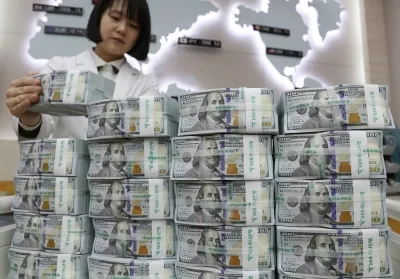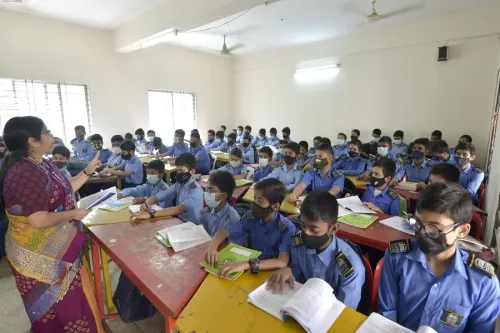Tariff Conflict: Korean Won Hits Lowest Value Since 2008 Financial Crisis

Synopsis
Key Takeaways
- Korean won reaches lowest level since 2008.
- Concerns about Trump's tariff plans impact the economy.
- Local currency shows high volatility in recent trading.
- KOSPI index sees gains despite currency decline.
- Government monitoring financial markets closely.
Seoul, April 8 (NationPress) The South Korean currency has significantly depreciated against the US dollar on Tuesday, hitting its lowest point in over 16 years due to escalating worries regarding the repercussions of the Donald Trump administration's extensive tariff strategy on the economy.
At 3:30 p.m., the Korean won was valued at 1,473.2 won per dollar, declining by 5.4 won from the previous trading day, as reported by Yonhap news agency.
This value is the lowest since March 13, 2009, when the won reached 1,483.5 won as the nation was dealing with the fallout from the global financial crisis.
The won opened at 1,471.0 won, down 3.2 won from the prior session, and fluctuated to a low of 1,473.75 won during intraday trading.
The local currency has experienced considerable volatility since U.S. President Donald Trump declared plans last week to impose "reciprocal" tariffs on imports from various countries, including a 25 percent duty on South Korean products.
These country-specific tariffs are scheduled to take effect starting Wednesday (U.S. time), while a 10 percent "baseline" tariff on foreign imports commenced last Saturday.
On Monday, Trump also cautioned about imposing additional 50 percent tariffs on China if Beijing did not retract its retaliatory 34 percent tariffs against the U.S., adding that tariff negotiations with other nations will begin "immediately."
The local currency has remained around the 1,450 won threshold since December amid warnings of U.S. tariffs and a domestic political crisis triggered by then-President Yoon Suk Yeol's martial law imposition on December 3.
"Volatility in the country’s financial and foreign exchange markets is likely to persist. The government will keep a close watch on the situation with heightened alertness," stated the finance ministry in a press release.
Meanwhile, shares in Seoul closed higher on Tuesday, breaking a four-day losing streak, bolstered by gains in technology and defense sector stocks, although the Korean won depreciated against the dollar.
The benchmark Korea Composite Stock Price Index (KOSPI) increased by 6.03 points, or 0.26 percent, finishing at 2,334.23, recovering from a 5.57 percent decline the day prior amid fears of a global trade war.
Trading volume was moderate at 548.25 million shares, valued at 8.9 trillion won (US$6.03 billion), with the number of gainers surpassing that of losers at 544 to 343.
Individual investors purchased a net 601.54 billion won worth of stocks, counteracting the selling by institutions and foreign investors, which amounted to 89.87 billion won and 642.52 billion won, respectively.









